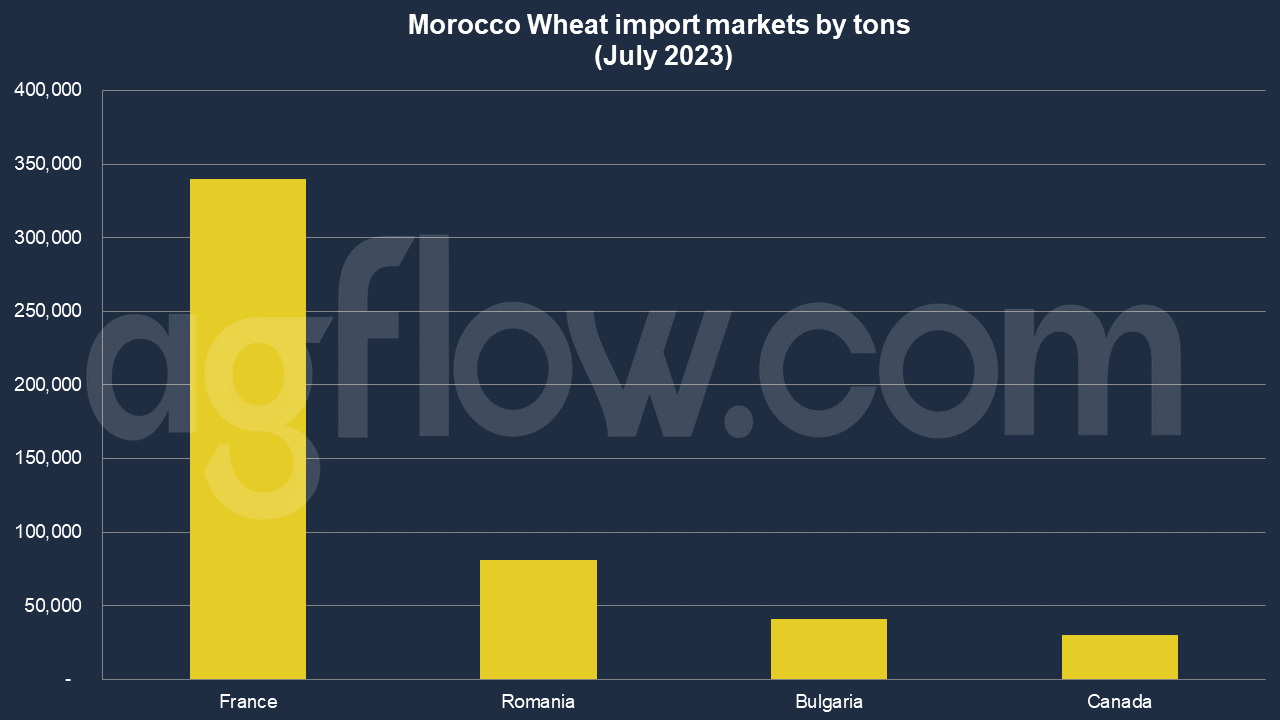Morocco’s Wheat Imports: France On the Top
Talk to our team about AgFlow's offering →
Reading time: 2 minutes
In the vast tapestry of global trade, Morocco stands as a significant player in the wheat import market. But what drives this North African nation’s hunger for this golden grain? And how have the first seven months of 2023 shaped its import dynamics? Let’s delve deep into the intricacies of Morocco’s wheat imports.
Why is Wheat So Essential to Morocco?
To understand the importance of wheat to Morocco, one must first grasp its cultural and economic significance. Wheat, for Moroccans, isn’t just a staple; it’s a symbol of sustenance and prosperity. From the bustling streets of Marrakech to the serene landscapes of the Atlas Mountains, wheat finds its way into traditional dishes, rituals, and the very fabric of Moroccan life.
Factors Impacting Morocco’s Wheat Imports in 2023
• Global Wheat Production: The year 2023 has seen fluctuations in global wheat production. Droughts in some major wheat-producing regions have led to a decrease in global supply. How does this affect Morocco? A reduced supply often translates to increased prices, making the cost of importing wheat steeper for Morocco.
• Domestic Production: Morocco’s own wheat production has its set of challenges. While the nation strives for self-sufficiency, unpredictable weather patterns and water scarcity issues often play spoilsport when domestic production dips, and the need for imports rises.
• Economic Considerations: The Moroccan Dirham’s strength against major currencies in 2023 has played a pivotal role. A stronger Dirham can make imports cheaper, but what if the global wheat prices skyrocket due to supply constraints?
• Trade Agreements: Morocco’s trade agreements with major wheat-exporting countries can significantly impact the import dynamics. Favorable terms can lead to increased imports, even if global prices are high.
According to AgFlow data, Morocco imported 0.33 million tons of Wheat from France in Jan – July 2023, followed by Romania (81,000 tons), Bulgaria (41,000 tons), and Canada (30,000 tons). Total imports hit 1.6 million tons in Jan-July 2023. Morocco was purchasing large amounts of Wheat from Canada, France, and Russia such as 55,000 tons, 48,500 tons, and 46,700 tons, respectively. France’s main Wheat shipping port was Rouen.
July shipments were the largest in Jan – July of 2023, with 0.3 million tons. The following months were Mar (0.3 million tons), Apr (0.23 million tons), May (0.18 million tons), and Feb (0.14 million tons).

The Delicate Balance of Trade-offs
Imagine walking on a tightrope, where every step must be measured, every gust of wind anticipated. That’s the challenge Morocco faces in balancing its wheat imports. On the one hand, there’s the need to ensure food security for its citizens. On the other, there’s the economic burden of importing expensive wheat.
So, what’s the solution? Is it to invest more in domestic production? But what about the challenges posed by nature? Or should Morocco diversify its import partners, spreading the risk? But then, what about the quality and consistency of wheat?
Navigating the wheat import market isn’t just about understanding numbers and trends. It’s about anticipating challenges and strategizing accordingly. For Morocco, these challenges could range from geopolitical tensions affecting trade routes to new strains of crop diseases impacting global wheat production.
Moreover, with the world becoming increasingly conscious about sustainability, how does Morocco ensure that its wheat imports are both economically viable and environmentally sustainable?
In Conclusion
The story of Morocco’s wheat imports in 2023 is not just about trade statistics. It’s a narrative woven with cultural significance, economic considerations, and global dynamics. As we move forward, one thing is clear: Morocco’s journey in the wheat import market is a testament to its resilience, adaptability, and undying spirit.
For professionals in the agricultural commodity industry, understanding these nuances is crucial. And for the general audience, it’s a fascinating glimpse into the world of global trade, where every decision, every challenge, and every triumph has a story to tell.
Try AgFlow Free
Access Free On Updates for Corn, Wheat, Soybean,
Barley, and Sunflower Oil.
No Credit Card Required & Unlimited Access In Time

